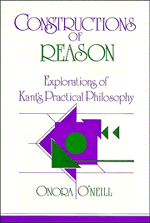6 - Between consenting adults
Published online by Cambridge University Press: 05 June 2012
Summary
Much of Kant's ethics is distant from the ordinary moral consciousness of our day. But one pair of Kantian notions is still widely current. Few moral criticisms strike deeper than the allegation that somebody has used another; and few ideals gain more praise than that of treating others as persons.
But this consensus is often shallow, since there is little agreement about what it takes to use others in morally problematic ways or to treat them as persons. I shall look here at three common conceptions of these ideals, which make little distinction between the two of them. I shall then outline interpretations of both that seem to me more convincing and richer than the commonly accepted ones. On the interpretations I offer the two ideals are distinct, though related. Merely not to be used is not enough for being treated as a person. Making another into a tool or instrument in my project is one way of failing to treat that other as a person; but only one way.
At a certain point I shall return to the Kantian texts to suggest that the sort of understanding of these ideals that I have outlined is at stake there. But the exegetical ambitions are limited. I shall say nothing about Kant's conception of a person and its supposed metaphysical background. I shall not spell out all the textual considerations that lie behind this reading of the Formula of the End-in-Itself.
- Type
- Chapter
- Information
- Constructions of ReasonExplorations of Kant's Practical Philosophy, pp. 105 - 125Publisher: Cambridge University PressPrint publication year: 1990
- 5
- Cited by



